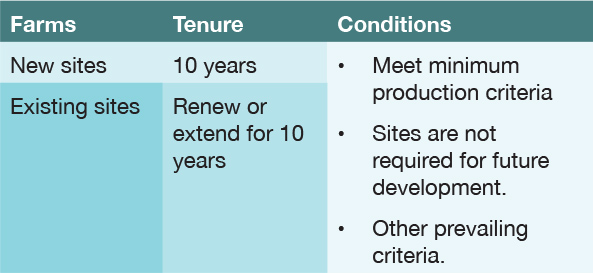the new agricultural policies.
Raising the Bar for Local Farm Productivity
landscape sector.
In the event that food supplies from overseas become unstable, it pays to have a level of self sufficiency to tide us over the shortage. This is why local farm production is important. Moreover, farms at home also serve as a platform for productive agricultural innovations to be tested. Ornamental fish and orchid farms should not be neglected too, as Singapore’s market share in these exports is significant.
The Ministry of National Development (MND), AVA, and National Parks Board (NParks) work collaboratively to help local farms and landscape nurseries to achieve greater output and sustain production. Our aim is to cultivate them into a high-tech and innovative sector that makes efficient use of land and labour resources.
AVA’s Food Fund has since 2009 been supporting local farms in upgrading production capability, as well as in conducting research and develop on farming technology. We have also been providing technical advisory through our workshops and seminars on topics related to production technology and good agricultural practices.
New Agriculture Productivity Fund
These various forms of assistance have bore some fruits. Notwithstanding this, as land is scarce in Singapore, there is a need to balance the different needs. Farms will need to achieve even higher productivity and use farmland more efficiently. To this end, farms can tap on the new Agriculture Productivity Fund (APF), which subsumes the existing Food Fund. The $63 million APF consists of two parts:
- $53 million for farm capability development to support productivity improvements in the farming sector.
- $10 million to support farms in carrying out R&D in innovative production technologies.

New Licensing Conditions
Given these productivity initiatives and the need to intensify the use of limited land, farms and landscape nurseries will have to meet the following new conditions:
At least 90 percent of the land must be used for farm production or landscape nursery purposes. The remaining 10 percent may be used for ancillary purposes (e.g. dwelling houses, workers quarters, offices, and visitor centres), compared to 30 percent previously. AVA will implement this requirement through the approval of farm plans and periodic farm inspections.
AVA’s farms must meet minimum production levels to qualify for new leases or lease extensions. Landscape nurseries must meet minimum productivity targets and be registered under NParks’ Landscape Company Register (LCR) and Nursery Accreditation Scheme (NAS). These minimum production levels are reasonable, as most farms should be able to meet them. The policy is applicable to all land based farms licensed by AVA and will be considered as a criteria for lease extension and for new leases.
Site Tenure
AVA and NParks will provide greater certainty to the farmers with a sufficient payback period to recoup productivity investments.
For landscape nurseries, NParks will tender sites on a 3+3+3 year tenancy basis. This stems from the nurseries’ different nature of operations which require lower upfront investment on infrastructure, with a shorter payback period.
Dr Mohamad Maliki bin Osman, Minister of State for National Development and Defence, who announced the new policies during a visit to Sky Greens farm, said: “Over the past few months, I have been visiting some of our farms to better understand their operations and concerns. These understandably focus on the cost of technology, land tenures, shortage of manpower, and business continuity. We have thus worked with AVA, NParks, Urban Redevelopment Authority and Singapore Land Authority on these new measures to address the concerns, with the overall aim of productivity improvements to benefit the farms.”
To apply for the APF and for more details on the new requirements, please visit www.ava.gov.sg (under Farm > Funding Schemes section).








